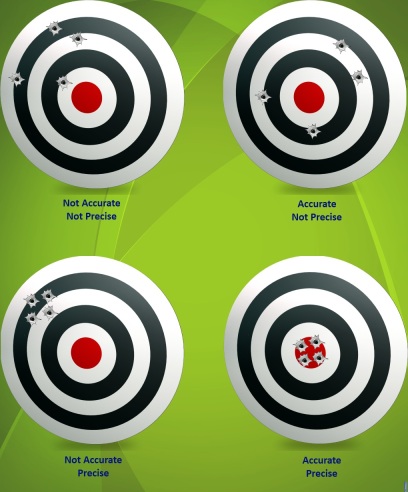With more queries recently about blood test results, I though it appropriate to explain a couple of significant reasons why looking at trends is important. Anyone wishing to record their blood tests can make use of the templates referenced in this post: healthunlocked.com/cllsuppo... The templates include lots of useful information explaining the relevance of each result to someone with CLL.
There are many influences over the final results that appear on your blood test print-out, such that you can get a wide range of test values from the same blood sample. For some interesting background on this, read SeymourB's long reply in this post: healthunlocked.com/cllsuppo...
In the bulls eye illustration above, what we want to achieve is hitting the target right in the centre (the true blood test result), time after time. To do that we need both precision (repeatability) and accuracy. Accuracy is determined by the design of the instrument and its regular calibration to a standard. Precision is determined by how well controlled the factors are that affect repeatability.
Without understanding these test instrument limitations, we can become concerned over apparent changes in our blood test results that are due to accuracy and precision limitations in the test equipment - our actual blood test value could well be the same or only slightly different from the last test result. Monitoring for trends overtime takes out the influence of these variances from the true result (and we'll hopefully be less anxious).
Dr. Susan Leclair has over 40 years of professional clinical hematology and oncology lab experience and has provided many excellent Patient Power videos where she explains how to interpret blood test results. Here she explains the limitations in blood testing that can cause variations: patientpower.info/video/is-...
Dr. Leclair's other Patient Power videos can be found here: patientpower.info/bio/susan...
I've taken the illustration from The Skinny on Precision and Bias: Aiming Our Sights on Precision: aashtoresource.org/universi...
Wikipedia also has a reference on these important limiting factors
en.wikipedia.org/wiki/Accur...
Neil
